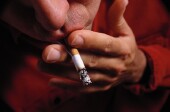Smokers Sleep Less Soundly
They're 4 times more likely than nonsmokers to report lack of restful slumber, study says.
|
E-mail this article
Subscribe to news
Printer friendly version
|

(SOURCE: American College of Chest Physicians, news release, Feb. 4, 2008)
TUESDAY, Feb. 5 (HealthDay News) -- Smokers are four times more likely to feel tired when they wake up and they spend less time in deep sleep than nonsmokers do, a new study finds.
This may be because smokers experience nicotine withdrawal each night, which may contribute to sleep disturbances, suggest the study authors, whose report appears in the February issue of Chest.
"It is possible that smoking has time-dependent effects across the sleep period. Smokers commonly experience difficulty falling asleep due to the stimulating effects of nicotine. As night evolves, withdrawal from nicotine may further contribute to sleep disturbance," study author Dr. Naresh M. Punjabi, of Johns Hopkins University School of Medicine in Baltimore, said in a prepared statement.
Punjabi and colleagues studied the sleep patterns of 40 smokers and 40 nonsmokers. They found that 22.5 percent of smokers reported a lack of restful sleep, compared with only 5 percent of nonsmokers. Smokers also experienced a lower percentage of deep sleep and a higher percentage of light sleep.
The largest differences in sleep between the two groups occurred at the onset of sleep, which suggests the effects of nicotine are strongest in the early stages of sleep and decrease as the sleep cycle progresses, the researchers said.
These findings may help develop more effective ways to help people stop smoking.
"Many smokers have difficulty with smoking cessation partly because of the sleep disturbances as a result of nicotine withdrawal," Punjabi said. "By understanding the temporal effects of nicotine on sleep, we may be able to better tailor nicotine replacement to minimize the withdrawal effects that smokers experience, particularly during sleep."
More information
The American Academy of Family Physicians explains insomnia. 
Copyright © 2008 ScoutNews, LLC. All rights reserved. 
HealthDayNews articles are derived from various sources and do not reflect federal policy. healthfinder.gov does not endorse opinions, products, or services that may appear in news stories. For more information on health topics in the news, visit the healthfinder.gov health library.